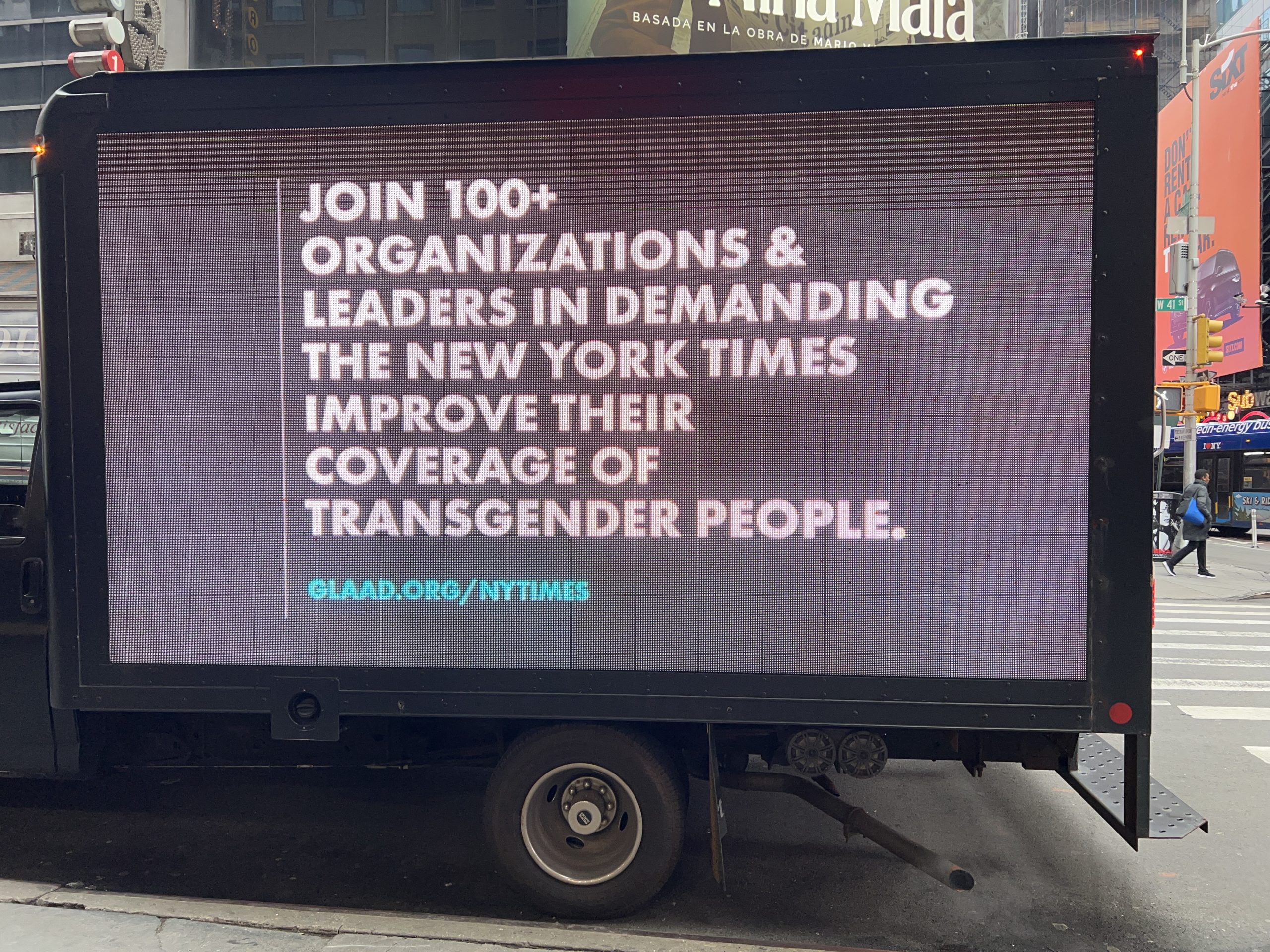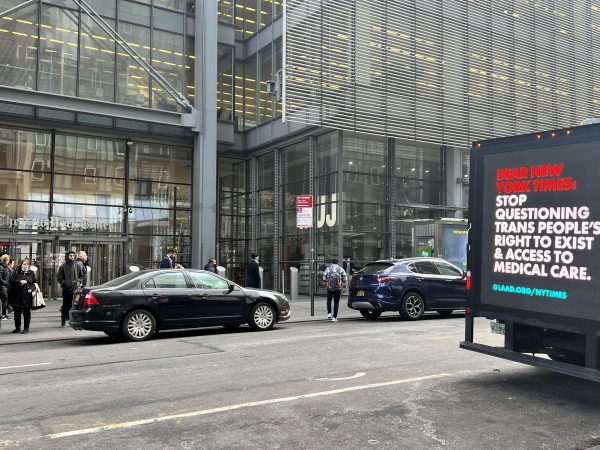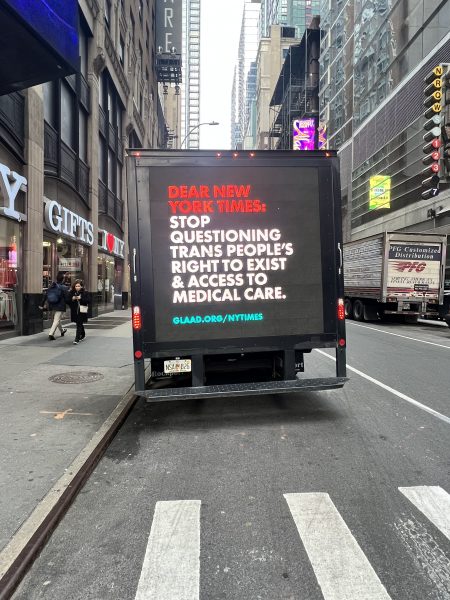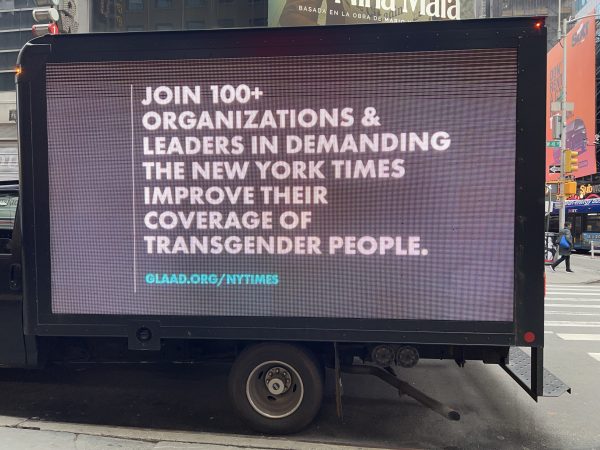National
New York Times called out for coverage of transgender people
GLAAD billboard circled newspaper’s Manhattan headquarters on Wednesday morning

In a one-two punch aimed directly at the New York Times; more than 100 contributing writers, fellow journalists, celebrities and advocacy organizations today joined GLAAD in demanding change in how the newspaper covers transgender issues and trans people.
First, GLAAD hired a billboard truck to circle the newspaper’s Manhattan headquarters this morning with signs saying, “Dear New York Times: Stop questioning trans people’s right to exist and access to medical care,” among other messages.
“I think what what’s most upsetting here is the damage this is doing,” Sarah Kate Ellis, GLAAD CEO and president of the world’s largest LGBTQ media advocacy organization, told the Washington Blade in her first phone interview on the topic Tuesday. “Every day they’re not stopping is doing more damage. Every time a new article comes out that debates whether or not trans people should receive board-approved healthcare is damaging. And so I feel really strongly that their coverage is dangerous.”
Then, to protest what GLAAD calls the Times’ “irresponsible, biased coverage of transgender people,” representatives of the organization joined contributors for the Times outside the paper’s building this morning, as they delivered two open letters and issued a joint statement, calling out a “pattern of inaccurate, harmful trans coverage.”
The coalition demands the Times immediately “stop printing biased, anti-trans stories,” meet with members and leaders in the trans community within two months, and within three months hire at least four trans writers and editors as full-time members of the Times staff.

Joining GLAAD are the Human Rights Campaign, PFLAG, the Transgender Law Center, Transgender Legal Defense and Education Fund, the Women’s March, director Judd Apatow, comedian Margaret Cho, actor Wilson Cruz, actresses Tommy Dorfman, Lena Dunham, Jameela Jamil, drag superstar Peppermint, activist Ashlee Marie Preston, Jeopardy! champion Amy Schneider, writer/director/actress Shakina, actress, Instagram influencer and stepmom to Zaya, Gabrielle Union-Wade, TV personality Jonathan Van Ness, activist Charlotte Clymer and more.
“This has been an effort at GLAAD for over a year now,” Ellis told the Blade. “We’ve had several off-the-record meetings with the New York Times to share with them our concerns about the coverage and the reporting that they’ve been doing on the trans community.”
But those concerns fell on deaf ears, said Ellis, and the conversations were unfruitful. “We wouldn’t be going out with a public letter in coalition if they were fruitful. You know, for us going public, it’s always the last resort.”
Times Journalists Speak Out
As GLAAD worked toward publishing its letter, the organization was contacted by Times contributors already in the process of composing their own. A core team of eight journalists collaborated to condemn what they called the newspaper’s anti-trans bias and the real-world impact of that transphobic coverage.
The authors are Times freelancers Harron Walker, Eric Thurm, who is also campaigns coordinator at the National Writers Union and a steering committee member of the Freelance Solidarity Project, Sean T. Collins, who is also a member and organizer of the Freelance Solidarity Project, Cecilia Gentili, a longtime trans activist, Jo Livingstone, Muna Mire, and Chris Randle, a member of the steering committee at the Freelance Solidarity Project.
They were joined by Olivia Aylmer, a member of the steering committee at the Freelance Solidarity Project who is not a freelancer for the Times.
Not only did other contributing writers sign-on, but so did journalism colleagues, both cisgender and trans, as well as members of the Trans Journalists Association.
“A diverse group of people came together to bring you this complaint,” they wrote. ”Some of us are trans, nonbinary, or gender nonconforming, and we resent the fact that our work, but not our person, is good enough for the paper of record. Some of us are cis, and we have seen those we love discover and fight for their true selves, often swimming upstream against currents of bigotry and pseudoscience fomented by the kind of coverage we here protest.”
Those signing that letter include Ashley P. Ford, Roxane Gay, Carmen Maria Machado Thomas Page McBee, Andrea Long Chu, Carmen Maria Machado, John Cameron Mitchell, Zach Stafford, Raquel Willis and Maia Monet, among others.
Their letter, addressed directly to Times Standards Editor Philip Corbett, calls out the country’s third most-read paper for executing what it says is “poor editorial judgment,” repeated lack of context in its reporting on trans issues and following “the lead of far-right hate groups in presenting gender diversity as a new controversy, warranting new, punitive legislation.”
“There is in fact an unethical bias against trans people and transnesss within its coverage of trans issues, by and large,” said Walker, one of the organizers of the contributors’ letter. “There is a pattern of bias, and it’s a violation of the standards own policy as laid out by the standards desk.”

States that have seized upon this anti-trans reporting and opinion pieces by the Times include Alabama, Arkansas and Texas. Already, those states have joined Florida, Oklahoma, South Dakota, Tennessee and Utah in enacting discriminatory legislation.
Of these, Utah and South Dakota have passed healthcare bans that journalist Erin Reed calls “exceedingly cruel.” For example, South Dakota’s ban is one of those providing specific provisions on how to medically detransition trans teenagers, a practice now state law in Alabama and Arkansas.
“The New York Times coverage is feeding into defending these laws, by virtue of the fact that it’s the so-called paper of record,” Walker told the Blade. “It has one of the largest reaches of any newspaper in the world, it is respected. Even if people on the far right may dismiss it as the ‘failing New York Times,’ it still holds a legitimacy in a process that, you know, means something.”
‘Pattern of bias’
“Plenty of reporters at the Times cover trans issues fairly,” the contributing writers’ letter states. “Their work is eclipsed, however, by what one journalist has calculated as over 15,000 words of front-page Times coverage, debating the propriety of medical care for trans children published in the last eight months alone.”
GLAAD notes that officials in Texas quoted Emily Bazelon’s June 2022 report to go after families of trans youth in court documents over their private, evidence-based healthcare decisions.
Former Arkansas Attorney General Leslie Rutledge cited three Times articles in her amicus brief supporting an Alabama law that criminalizes doctors and parents for ensuring trans youth can access necessary medical care: Bazelon’s 2022 story, Azeen Ghorayshi’s January 2022 piece, and Ross Douthat’s April 2022 op-ed.
The Times’ reporting on trans youth and its reputation as the “paper of record” was cited just last week to justify a bill in a Nebraska legislative hearing, that would criminalize healthcare for trans youth.
Scores of other bills are in the works. Missouri Republicans are once again pushing for healthcare bans. Anti-trans bills in Montana, West Virginia and Mississippi have passed an entire chamber.
But by far the worst anti-transgender legislation and existing laws against the trans community are already on the books in Texas, which Reed calls “home to the weaponization of [Department of Protective Family Services] against transgender people.”
New restrictive bathroom laws are in place in Oklahoma, Alabama and Tennessee. Oklahoma’s healthcare ban restricts even adults, up to the age of 26, from accessing gender-affirming care. Florida has banned Medicaid coverage for trans-related healthcare for adults and is banning gender affirming care for trans teens. And as mentioned earlier, Utah, South Dakota, Arkansas and Alabama have targeted trans teens as well.
‘Britification’ of American media
For the most part over the last two decades, U.S. media had reliably shared a positive view of transgender people, especially youth, highlighting the stories of out trans celebrities like Chaz Bono, Laverne Cox, Caitlyn Jenner and Jazz Jennings. But since the Obergefell decision at the U.S. Supreme Court in 2015, trans people have become the religious right’s handy-dandy political boogeyman, to scare the flocks, rally the base and get out the vote. That’s a shift that was preceded by all-out negative coverage of trans issues in the U.K., where with rare exception the mainstream media is in lockstep with what is called the “Gender Critical” movement, opposing trans rights.
Ari Drennen is the LGBTQ program director for Media Matters, and has been tracking coverage of trans issues at the Times.
“I think it’s good to see people speaking up and talking about the really troubling pattern of coverage coming out of the Times, just because the Times is seen as the kind of gold standard for a lot of mainstream liberals,” Drennen told the Blade. “That pattern is especially notable at the Times. But there has been a sort of, you know, Britification, for lack of a better word, of the American media’s approach to trans people.”
Drennen cites a Reuters article from October about gender-affirming care for trans children that featured an extreme close-up photograph of a child wearing braces with a hormone pill on their tongue. “That was really just clearly intended to scare parents,” she said.
Also keeping a close watch on the Times and this Britification effect is Alejandra Caraballo, a clinical instructor at Harvard Law School’s Cyberlaw Clinic, where she works to advance the civil rights of LGBTQ people in a variety of civil legal contexts such as healthcare access, immigration and family law.
“In the U.K., the far right, particularly the religious far right, is almost a non-entity. They just don’t have the kind of cultural power and political power that they do in the United States,” Caraballo told the Blade, noting that the Gender Critical movement has taken a a more secular approach to its opposition to trans people, rather than a religious angle.
“In the United States, it’s always been the religious far right, but they are now trying to launder those narratives through these kind of secular outlets, to try to make it seem that the concerns aren’t just inherently based on religious ideology,” she said. “Part of it is this concerted strategy that I think a lot of the Gender Criticals have of particularly appealing to narratives that upper middle class white women would often be more amenable to, especially this idea that women have fought for rights, and somehow the existence of trans people is undermining those rights, because it’s hard to just oppose rights for people if it doesn’t impact you, so you have to create a sense of scarcity, and that’s what they do there. They say that ‘This is erasing women,’ ‘This is erasing women’s rights.’”
Racial bias
Caraballo noted that the people who are writing these stories at the Times are almost universally upper middle class, middle-aged white women, which speaks to the lack of racial diversity at the newspaper.
“I think what’s interesting is the kind of subject of every panic about over-medicalization in mainstream media tend to be white, and then the subject of the panic about kids and sports tend to be Black,” said Drennen. “I don’t need to have a Ph.D to see what’s going on.”
“I think part of it speaks to the lack of racial diversity,” echoed Caraballo. “I’m not surprised that one of the first really positive, outspoken editorials in the opinion column in the New York Times was by a Black man. I think there’s a sense of solidarity and understanding of how these things work, and I think when you have no trans people in the newsroom and no trans people as opinion columnists, and you have a newsroom that’s almost entirely stocked with a demographic that is particularly being targeted by Gender Criticals for pushing their views. I think it’s not a surprise.”
Anti-trans agenda
Caraballo said her conversations with people who work at the Times leads her to suspect this shift toward anti-trans narratives is not the writers or reporters themselves, but the result of an agenda set by their editors.
“For some people like Katie J.M. Baker, who has written extensively about how the media actually works to push transphobic narratives, to then write an article like she did about forcibly outing trans students, it just speaks to either opportunism, not really having a deeply-held belief about this, or just being pushed by the editors. I mean, this was her first major story,” she said. “I worry that what happens is the New York Times often times gives those kinds of views credibility. And you see this with the anti-trans people celebrating every one of these articles, because they view that they’re trans eliminationist and anti-trans positions are being laundered into the mainstream.”
Anti-trans tipping point
In 2014, Time Magazine put Laverne Cox on its cover and declared that trans Americans had achieved a tipping point in acceptance. But at the Times, a shift in who writes opinion pieces has tipped the balance the other way, noted Drennen.
“The New York Times has never been perfect in their coverage, of course. But over the last year, Jennifer Finney Boylan departed from the Times’s opinion section,” she said. While Boylan is still a freelancer for the Times, the bestselling author and scholar’s byline now regularly appears in the Washington Post.
“In the interim, they’ve added two incredibly anti-trans regular columnists, Pamela Paul and David French, the former lawyer for the anti-LGBTQ+ hate group, the Alliance Defending Freedom. This has a really troubling pattern of anti-trans sentiment. So, any perceived balance there was just got totally blown out the window over the last year.”
“I’m proud of the work I did for Times Opinion from 2007 to 2022, on hundreds of topics from presidential dogs to the history of the Negroni,” Boylan told the Blade. “As a freelancer, I felt lucky to have a regular slot on the page and was grateful for the trust the editors placed in me. I also wrote many essays about trans identity and trans politics, and was proud to be, for many years, the only ongoing voice on the page representing the wide range of trans identities. I am hoping all those stories put a human face to trans issues for readers of the Times, and opened some hearts.”
Boylan’s name does not appear alongside other Times freelancers in the open letter or the GLAAD letter, but ironically, the Times has been publishing her name in its Bestsellers list for 18 weeks in a row. Her novel, Mad Honey, co-written with Jodi Picoult, has yet to be reviewed in the newspaper or covered in any way, despite it being the most successful book co-written by any transgender person, ever. Is that more evidence of bias, or just a coincidence?
The science ‘debate’
“I am really disappointed that it’s come to this,” said Ellis. “The science is settled on transgender health care. As far as the New York Times is concerned, it is not settled science and they want to use their pages to debate it.”

“It’s so dehumanizing,” added Caraballo, “because you have people debating your rights who have no stake in it whatsoever. They’re not the ones that are going to be denied healthcare. They’re not the ones who are going to be denied housing. They’re not the ones who are going to be kicked out of their homes when they’re forcibly outed to their parents. They have no stake in this. And that is particularly what’s so upsetting, to see all these people that literally will never feel the effects of these policies, constantly talking about how they have ‘concerns.’”
Will the Times agree to their demands?
Drennen said it’s hard to say whether these open letters will have any impact, because “so much of their decision-making is internal.”

For her part, Walker said she remains excited by the coalition that’s been assembled and optimistic, but also realistic.
“Ideally what happens is the New York Times says, ‘Okay, yeah, let’s stop debating whether trans people should be allowed,’ and they start hiring a bunch of trans people. It’s the end of the story. I’m also realistic. I think it’s important to keep some idealism and some optimism in place and also realistic at the same time, which I also think is important. And I fully expect them to do their best to ignore it.”
“We’re too loud to ignore. If you ignore our letter, we’ll find some other way. If you ignore that, we’ll find another way,” Ellis said. “We’re not going to quit until the New York Times acknowledges our demands. And our demands are not outrageous. Within the letter, we’re just talking about stopping your irresponsible reporting, meeting with the trans community and hiring trans writers and editors. These are not outrageous demands that we’re making.”
Charlie Stadtlander, the director of external communications, newsroom, for the Times responded Wednesday afternoon in an email to the Blade addressing the controversy:
“We received the open letter delivered by GLAAD and welcome their feedback. We understand how GLAAD and the co-signers of the letter see our coverage. But at the same time, we recognize that GLAAD’s advocacy mission and the Times’s journalistic mission are different.
As a news organization, we pursue independent reporting on transgender issues that include profiling groundbreakers in the movement, challenges and prejudice faced by the community, and how society is grappling with debates about care.
The very news stories criticized in their letter reported deeply and empathetically on issues of care and well-being for trans teens and adults. Our journalism strives to explore, interrogate and reflect the experiences, ideas and debates in society — to help readers understand them. Our reporting did exactly that and we’re proud of it.”
Read the letters and who signed them by clicking here.
Federal Government
Treasury Department has a gay secretary but LGBTQ staff are under siege
Agency reverses course on LGBTQ inclusion under out Secretary Scott Bessent

A former Treasury Department employee who led the agency’s LGBTQ employee resource group says the removal of sexual orientation and gender identity (SOGI) from its discrimination complaint forms was merely a formalization of existing policy shifts that had already taken hold following the second inauguration of President Donald Trump and his appointment of Scott Bessent — who is gay — to lead the agency.
Christen Boas Hayes, who served on the policy team at Treasury’s Financial Crimes Enforcement Network (FinCEN) from 2020 until March of this year, told the Washington Blade during a phone interview last week that the agency had already stopped processing internal Equal Employment Opportunity (EEO) complaints on the basis of anti-LGBTQ discrimination.
“So the way that the forms are changing is a procedural recognition of something that’s already happening,” said Hayes. “Internally, from speaking to two EEO staff members, the changes are already taking place from an EEO perspective on what kind of cases will be found to have the basis for a complaint.”
The move, they said, comes amid the deterioration of support structures for LGBTQ workers at the agency since the administration’s early rollout of anti-LGBTQ executive orders, which led to “a trickle down effect of how each agency implements those and on what timeline,” decisions “typically made by the assistant secretary of management’s office and then implemented by the appropriate offices.”
At the end of June, a group of U.S. House Democrats including several out LGBTQ members raised alarms after a Federal Register notice disclosed Treasury’s plans to revise its complaint procedures. Through the agency’s Office of Civil Rights and EEO, the agency would eliminate SOGI as protected categories on the forms used by employees to initiate claims of workplace discrimination.
But Hayes’s account reveals that the paperwork change followed months of internal practice, pursuant to a wave of layoffs targeting DEI personnel and a chilling effect on LGBTQ organizing, including through ERGs.
Hayes joined Treasury’s FinCEN in 2020 as the agency transitioned into the Biden-Harris administration, working primarily on cryptocurrency regulation and emerging technologies until they accepted a “deferred resignation” offer, which was extended to civil servants this year amid drastic staffing cuts.
“It was two things,” Hayes said. “One was the fact that the policy work that I was very excited about doing was going to change in nature significantly. The second part was that the environment for LGBTQ staff members was increasingly negative after the release of the executive orders,” especially for trans and nonbinary or gender diverse employees.
“At the same time,” Hayes added, “having been on the job for four years, I also knew this year was the year that I would leave Treasury. I was a good candidate for [deferred resignation], because I was already planning on leaving, but the pressures that emerged following the change in administration really pushed me to accelerate that timeline.”
Some ERGs die by formal edict, others by a thousand cuts
Hayes became involved with the Treasury LGBTQ ERG shortly after joining the agency in 2020, when they reached out to the group’s then-president — “who also recently took the deferred resignation.”
“She said that because of the pressure that ERGs had faced under the first Trump administration, the group was rebuilding, and I became the president of the group pretty quickly,” Hayes said. “Those pressures have increased in the second Trump administration.”
One of the previous ERG board members had left the agency after encountering what Hayes described as “explicitly transphobic” treatment from supervisors during his gender transition. “His supervisors denied him a promotion,” and, “importantly, he did not have faith in the EEO complaint process” to see the issues with discrimination resolved, Hayes said. “And so he decided to just leave, which was, of course, such a loss for Treasury and our Employee Resource Group and all of our employees at Treasury.”
The umbrella LGBTQ ERG that Hayes led included hundreds of members across the agency, they said, and was complemented by smaller ERGs at sub-agencies like the IRS and FinCEN — several of which, Hayes said, were explicitly told to cease operations under the new administration.
Hayes did not receive any formal directive to shutter Treasury’s ERG, but described an “implicit” messaging campaign meant to shut down the group’s activities without issuing anything in writing.
“The suggestion was to stop emailing about anything related to the employee resource group, to have meetings outside of work hours, to meet off of Treasury’s campus, and things like that,” they said. “So obviously that contributes to essentially not existing functionally. Because whereas we could have previously emailed our members comfortably to announce a happy hour or a training or something like that, now they have to text each other personally to gather, which essentially makes it a defunct group.”
Internal directories scrubbed, gender-neutral restrooms removed
Hayes said the dismantling of DEI staff began almost immediately after the executive orders. Employees whose position descriptions included the terms “diversity, equity, and inclusion” were “on the chopping block,” they said. “That may differ from more statutorily mandated positions in the OMWI office or the EEO office.”
With those staff gone, so went the infrastructure that enabled ERG programming and community-building. “The people that made our employee resource group events possible were DEI staff that were fired. And so, it created an immediate chilling effect on our employee resource group, and it also, of course, put fear into a lot of our members’ hearts over whether or not we would be able to continue gathering as a community or supporting employees in a more practical way going forward. And it was just, really — it was really sad.”
Hayes described efforts to erase the ERGs from internal communication channels and databases. “They also took our information off internal websites so nobody could find us as lawyers went through the agency’s internal systems to scrub DEI language and programs,” they said.
Within a week, Hayes said, the administration had removed gender-neutral restrooms from Main Treasury, removed third-gender markers from internal databases and forms, and made it more difficult for employees with nonbinary IDs to access government buildings.
“[They] made it challenging for people with X gender markers on identification documents to access Treasury or the White House by not recognizing their gender marker on the TWAVES and WAVES forms.”
LGBTQ staff lack support and work amid a climate of isolation
The changes have left many LGBTQ staff feeling vulnerable — not only because of diminished workplace inclusion, but due to concerns about job security amid the administration’s reductions in force (RIFs).
“Plenty of people are feeling very stressed, not only about retaining their jobs because of the layoffs and pending questions around RIFs, but then also wondering if they will be included in RIF lists because they’re being penalized somehow for being out at work,” Hayes said. “People wonder if their name will be given, not because they’re in a tranche of billets being laid off, but because of their gender identity or sexual orientation.”
In the absence of functional ERGs, Hayes said, LGBTQ employees have been cut off from even informal networks of support.
“Employees [are] feeling like it’s harder to find members of their own community because there’s no email anymore to ask when the next event is or to ask about navigating healthcare or other questions,” they said. “If there is no ERG to go to to ask for support for their specific issue, that contributes to isolation, which contributes to a worse work environment.”
Hayes said they had not interacted directly with Secretary Bessent, but they and others observed a shift from the previous administration. “It is stark to see that our first ‘out’ secretary did not host a Pride event this year,” they said. “For the last three years we’ve flown the rainbow Pride flag above Treasury during Pride. And it was such a celebration among staff and Secretary Yellen and the executive secretary’s office were super supportive.”
“Employees notice changes like that,” they added. “Things like the fact that the Secretary’s official bio says ‘spouse’ instead of ‘husband.’ It makes employees wonder if they too should be fearful of being their full selves at work.”
The Blade contacted the Treasury Department with a request for comment outlining Hayes’s allegations, including the removal of inclusive infrastructure, the discouragement of ERG activity, the pre-formalization of EEO policy changes, and the targeting of DEI personnel. As of publication, the agency has not responded.
U.S. Supreme Court
Supreme Court to consider bans on trans athletes in school sports
27 states have passed laws limiting participation in athletics programs

The U.S. Supreme Court on Thursday agreed to hear two cases involving transgender youth challenging bans prohibiting them from participating in school sports.
In Little v. Hecox, plaintiffs represented by the ACLU, Legal Voice, and the law firm Cooley are challenging Idaho’s 2020 ban, which requires sex testing to adjudicate questions of an athlete’s eligibility.
The 9th U.S. Circuit Court of Appeals described the process in a 2023 decision halting the policy’s enforcement pending an outcome in the litigation. The “sex dispute verification process, whereby any individual can ‘dispute’ the sex of any female student athlete in the state of Idaho,” the court wrote, would “require her to undergo intrusive medical procedures to verify her sex, including gynecological exams.”
In West Virginia v. B.P.J., Lambda Legal, the ACLU, the ACLU of West Virginia, and Cooley are representing a trans middle school student challenging the Mountain State’s 2021 ban on trans athletes.
The plaintiff was participating in cross country when the law was passed, taking puberty blockers that would have significantly reduced the chances that she could have a physiological advantage over cisgender peers.
“Like any other educational program, school athletic programs should be accessible for everyone regardless of their sex or transgender status,” said Joshua Block, senior counsel for the ACLU’s LGBTQ and HIV Project. “Trans kids play sports for the same reasons their peers do — to learn perseverance, dedication, teamwork, and to simply have fun with their friends,” Block said.
He added, “Categorically excluding kids from school sports just because they are transgender will only make our schools less safe and more hurtful places for all youth. We believe the lower courts were right to block these discriminatory laws, and we will continue to defend the freedom of all kids to play.”
“Our client just wants to play sports with her friends and peers,” said Lambda Legal Senior Counsel Tara Borelli. “Everyone understands the value of participating in team athletics, for fitness, leadership, socialization, and myriad other benefits.”
Borelli continued, “The U.S. Court of Appeals for the Fourth Circuit last April issued a thoughtful and thorough ruling allowing B.P.J. to continue participating in track events. That well-reasoned decision should stand the test of time, and we stand ready to defend it.”
Shortly after taking control of both legislative chambers, Republican members of Congress tried — unsuccessfully — to pass a national ban like those now enforced in 27 states since 2020.
Federal Government
UPenn erases Lia Thomas’s records as part of settlement with White House
University agreed to ban trans women from women’s sports teams

In a settlement with the Trump-Vance administration announced on Tuesday, the University of Pennsylvania will ban transgender athletes from competing and erase swimming records set by transgender former student Lia Thomas.
The U.S. Department of Education’s Office for Civil Rights found the university in violation of Title IX, the federal rights law barring sex based discrimination in educational institutions, by “permitting males to compete in women’s intercollegiate athletics and to occupy women-only intimate facilities.”
The statement issued by University of Pennsylvania President J. Larry Jameson highlighted how the law’s interpretation was changed substantially under President Donald Trump’s second term.
“The Department of Education OCR investigated the participation of one transgender athlete on the women’s swimming team three years ago, during the 2021-2022 swim season,” he wrote. “At that time, Penn was in compliance with NCAA eligibility rules and Title IX as then interpreted.”
Jameson continued, “Penn has always followed — and continues to follow — Title IX and the applicable policy of the NCAA regarding transgender athletes. NCAA eligibility rules changed in February 2025 with Executive Orders 14168 and 14201 and Penn will continue to adhere to these new rules.”
Writing that “we acknowledge that some student-athletes were disadvantaged by these rules” in place while Thomas was allowed to compete, the university president added, “We recognize this and will apologize to those who experienced a competitive disadvantage or experienced anxiety because of the policies in effect at the time.”
“Today’s resolution agreement with UPenn is yet another example of the Trump effect in action,” Education Secretary Linda McMahon said in a statement. “Thanks to the leadership of President Trump, UPenn has agreed both to apologize for its past Title IX violations and to ensure that women’s sports are protected at the university for future generations of female athletes.”
Under former President Joe Biden, the department’s Office of Civil Rights sought to protect against anti-LGBTQ discrimination in education, bringing investigations and enforcement actions in cases where school officials might, for example, require trans students to use restrooms and facilities consistent with their birth sex or fail to respond to peer harassment over their gender identity.
Much of the legal reasoning behind the Biden-Harris administration’s positions extended from the 2020 U.S. Supreme Court case Bostock v. Clayton County, which found that sex-based discrimination includes that which is based on sexual orientation or gender identity under Title VII rules covering employment practices.
The Trump-Vance administration last week put the state of California on notice that its trans athlete policies were, or once were, in violation of Title IX, which comes amid the ongoing battle with Maine over the same issue.
-

 Federal Government2 days ago
Federal Government2 days agoTreasury Department has a gay secretary but LGBTQ staff are under siege
-

 Virginia3 days ago
Virginia3 days agoDefying trends, new LGBTQ center opens in rural Winchester, Va.
-

 District of Columbia2 days ago
District of Columbia2 days agoGay GOP group hosts Ernst, 3 House members — all of whom oppose Equality Act
-

 Opinions4 days ago
Opinions4 days agoUSAID’s demise: America’s global betrayal of trust with LGBTQ people










